- Home
- Chris Petit
The Passenger Page 2
The Passenger Read online
Page 2
A hundred yards away two figures from the search party crouched, putting a corpse into what looked like a black bin liner. Collard moved towards them. The bag’s zip sounded like an impossibly loud tearing when they closed it. As they tried to lift it the weight was too much and the bag ripped. A bare female arm fell out, waxy pale in shocking contrast to the shiny plastic. A bracelet was still on the wrist.
Collard averted his eyes too late, the bare arm flopping out of the bag more shocking than if he had seen the whole body.
The elder, a man of about fifty, said, ‘These bags are worse than useless.’
Collard said there was tea at the hut.
The second, a lad of no more than twenty, said, ‘We can’t leave the body.’
The first man asked, ‘Do the cups have lids?’ He suggested the lad carry the teas back, so they wouldn’t both have to go.
It was Collard’s first dead body. He was aware of the inadequacy of his reaction: a little dizzy and dry-mouthed but more uncomfortable at the absurdity of offering tea. Perhaps Mona was right. The disaster had to be reduced to what was manageable.
He walked on, following the trail of debris, punctuated by groups of men guarding bodies. A pair of hiking boots, laces tied together, lay on a green. He nearly trod on an intact tube of toothpaste, the brand unknown to him.
The second body he came to was a child.
The searcher marking it spoke with tears in his eyes.
‘She can’t be more than five or six.’
The man’s young companion appeared unhinged.
‘She bounced. See where she landed.’
He pointed to an outline like a cartoon in the damp ground.
The disaster acquired its first sponsors when two large confectionery firms donated bars of chocolate and sweets for distribution. Collard’s worst imaginings were kept at bay by a mechanical repetition of the indefatigable Mona’s bidding, driving back to town to fill up the urns and going out again.
By late afternoon even her resolution wavered.
‘My belief is severely tested by what we have seen today. I know this is man’s doing, but how can God let it happen?’
She asked if he was a believer.
‘Not at the moment.’
‘You should see this place in summer. Beautiful country.’
Collard thought back to Nick leaving school less than six months before, marking the end of a stage and the start of his adult life.
It was almost dark. Tall pines lined both sides of the road. Collard had no idea what he would do about organizing a place to stay. He told Mona to stop. She looked embarrassed, thinking he wanted to relieve himself.
‘This is fine. I’ll walk back.’
‘It’s five miles to town. Are you all right? You’re very quiet.’
He said the walk would clear his head.
In the last of daylight he entered the wood, finding it blank and inviting, wanting to lose himself. The trees were so close it was impossible to keep direction. But it was less cold. He pushed in deeper. The ground was a bed of needles, dry, inviting him to lie down and rest.
He heard a helicopter. In a few moments it was overhead, low down, not much above the level of the wood, the din of its engine smothering the only other sound, of wind in the treetops. The helicopter had a searchlight. Collard’s heart raced. Light splashed through the branches, opening up a channel. The search was slow and methodical.
By the time the helicopter moved away, darkness had fallen.
The woods ended abruptly. Collard stood on the edge of a field, covered in a low mist. He wanted to turn back even as he moved forward, feeling his way, awkward tufts of grass underfoot.
A muffled cough came from close by. Collard froze. His first thought was that it was a patrol connected to the helicopter – but why would search teams be out in the dark with no torches? Something moved with a stealthy shuffle, and he stumbled on blindly. Then he heard the soft trample of hooves and recognized he was among cattle, except they were not keeping their distance the way cows did. They were near enough to touch, their tension palpable. Collard realized they must be in a state of collective shock, after witnessing the enormous fireball and hearing the crash, which a woman in town had said sounded like a huge boiler exploding.
Collard knew the cattle were guiding him to Nick. That was his punishment. His worst fear was that Nick had been so disfigured there would be no way to recognize him.
He trod on something and tripped. As he fell he was certain the animals would stampede and he would die there after all, trampled underfoot to be found next to his son.
Nothing happened. The cattle seemed to be protecting the body. Collard felt sodden material then icy flesh of a lifeless hand, the wrist and a watch. He could just make out a grey blur of face, darker at the bottom. What he thought was a terrible disfigurement was the man’s beard.
Beyond the field, after a short climb, Collard found a narrow road, above the level of the mist, with the shrouded field and dark mass of wood just visible behind him. He had no idea in which direction to head. He walked on, away from the woods into open country.
The noise of the helicopter returned.
In its approaching searchlight Collard caught sight of a large canvas screen erected in a field, guarded by armed men in unmarked uniforms.
He ducked down as a Land Rover appeared near the screen, its arrival masked by the clatter of the helicopter. Four more armed men jumped out, moving like a well-drilled team.
Several long, narrow crates were winched into the helicopter. Collard knew he shouldn’t be a witness to this.
He was hit hard from behind. Someone jumped on his back, knocking the wind out of him. His hair was grabbed and his head pulled up. He saw pointed guns. A blinding light shone in his face and a man shouted at him. He sounded American but with the noise of the helicopter Collard couldn’t be sure.
Collard managed to say he had got separated from his search party. He sensed panic behind the men’s aggression. Their violence seemed in some way linked to the greater devastation and provoked by it, not by him.
A boot pressed down on his head, shoving his face into the earth, making it hard to breathe. A gun barrel was pushed against his neck.
‘Waste the fuck,’ someone said.
Another laughed. ‘No shortage of stiffs around.’
They couldn’t go shooting people in fields, Collard prayed. People would hear the shots.
They hauled him to his feet and forced his hands in the air.
‘Who are you?’ Collard asked.
He was punched without warning in the head, hard enough to make him stagger and leave his ears ringing.
Something was thrown over him and he was frogmarched across the field, stumbling blindly, fearing what they had in mind. He would be put in the helicopter and thrown out. He hadn’t cheated death after all. It had come to find him.
The Old Spy’s Fate
James Jesus Angleton thought: Only fragments remain; the rest so hard to retrieve. Life makes no more sense now than it did then. However much was forgotten, it was always an old spy’s fate to remember.
He remembered long office nights of tough decisions, in the room, at the desk, blinds down, dry reasoning to justify cutting a man loose, followed by bad conscience that soured the whisky. He remembered always being impatient for the next drink, alcohol and nicotine his great mistresses, downing half and rubbing his mouth in the same way he had half a century earlier, after drinking pure spring water on the school run called the Ledder, one clear blue day in the Malvern Hills (not a Yank at Oxford but near enough). ELO’s ‘Mr Blue Sky’ was one of his favourites.
He remembered saying: ‘They’re setting him up.’ He had done the same many times, set a man up.
He remembered a cardinal, a future pope, skittish after three glasses of wine, saying, ‘Welcome to the labyrinth.’
He remembered thinking: Once you understand the principles of betrayal and negotiation, there are only certain wel
l-established tracks.
He remembered saying, ‘You think Nazir is working for Six,’ but could not recall the context.
He remembered being never happier than on solitary fishing trips, drinking beer in a country bar with the juke for company. Legend had him down for a highfalutin dandy, master of ambiguity and reader of poetry, where he saw his real tastes as simple: catalogue clothes, detective stories and Coke. The Brits he knew didn’t understand popular culture.
Hindsight let him see what he hadn’t then: another old spy searching his room, noting the neat sparse regularity of his personal possessions in contrast to the favoured chaos of the working method – a stage set dressed for effect, lowered Venetians, pools of light, wreaths of smoke, towers of files, and that huge desk.
He remembered splendid hangovers and monitoring signs of his rebelling body, ticking them off, and reacquainting himself with old friends such as Philby, who agreed Washington restaurants were so bad that in his words, ‘One is more or less reduced to liquid. Shall we?’
He remembered doing his best thinking drunk, drinking for many reasons apart from the obvious of what the alcohol did: test the boundaries of self-control while loosening some of the constraints. How close had the Great Traitor been to blurting, ‘Jimmy, old boy, I’m in a hell of a hole?’
He remembered a lifetime of dead secrets that lay scattered in his head like dried husks of grain. He felt older than Methuselah.
The American
Collard had no idea where he was or who the men questioning him were. The helicopter had landed almost immediately after taking off and he had been taken into a building, with his head still covered, into what was revealed to be a tiny windowless room. At first he was interrogated alone, at length, by a hostile Englishman with dirty fair hair and a flat Essex accent. The man insisted Collard had been spying in the field and wanted to know who he worked for. When Collard tried to explain why he was there he was shouted down.
They were joined by a second man who just watched. Neither his appearance nor manner seemed official. His large bald head was fringed by a monkish tonsure, except at the back where it had grown long and was tied in a pony-tail. Collard finally managed to say that he should have been on the crashed plane and was about to explain about Nick when the second man spoke.
‘Let me get this straight. You were booked through to New York. You flew from Frankfurt to London but you changed your mind and didn’t take the rest of the flight.’
He was American, his voice soft for such a big man. The gentle, admonitory tone threw Collard. Silence followed. The American’s bulk made the space seem smaller. He looked at Collard with hooded, hazel-flecked eyes and said he wanted his personal details.
Collard gave his name. As the American wrote it down his pencil snapped and he swore and walked out of the room, leaving the Englishman to take over.
Collard gave his address and particulars. He couldn’t imagine returning to a world of travel, meetings, deals and conferences.
He gave his profession as businessman.
‘What kind?’
He said technical equipment and left it at that.
The American returned and sat down. Collard was aware of him listening hard as he told them again how he had got off the flight in London.
‘Why?’
‘A last-minute business meeting.’
‘What happened to your baggage?’
‘I checked it in at Frankfurt.’
‘Did you change your ticket?’
‘I was going to when I heard the news.’
Collard heard the defensiveness creep into his voice.
‘You didn’t catch the flight but your baggage did.’
The questions were irrelevant and Collard’s anger surfaced as he addressed the American.
‘I was kidnapped by your men who led me to believe they were going to throw me out of a helicopter. Your friend here thinks I’m a spy. Now you want to make something of the fact that I failed to take my suitcase off the plane.’
‘You are an anomaly in the system by your own admission. What baggage did you check in?’
‘As I said, a suitcase.’
‘Describe it.’
‘It’s just a regular large suitcase.’
‘Colour?’
‘Yellow.’
‘Make?’
‘I don’t know.’
‘Made of?’
‘I don’t know.’
‘Canvas, leather?’
‘It’s a hard shell with rounded edges, some manmade fibre.’
The American nodded at the Englishman who produced a photo of a suitcase.
‘Like that?’ the American asked, leaning forward.
‘Like that.’
‘It’s a Samsonite.’
This was how they trapped people, he thought, with the simplest questions.
‘There must be millions like it. Am I being charged with something? Can I know who you are?’
The American put his face so close Collard could smell his breath.
‘What were you doing in Frankfurt?’
‘Business meetings.’
‘Did you buy anything while you were away?’
‘A personal organizer for my wife’s Christmas present and a Walkman for my son at Heathrow duty free.’
Collard thought of the presents, inadequate and hastily chosen.
‘What’s the matter?’ the American asked.
Collard remained silent.
‘Did you pack your own suitcase?’
‘Of course I did.’
‘Nobody gave you anything to carry for them?’
‘Are you saying there was a bomb on the plane and it was in a Samsonite suitcase?’
‘Is that what you’re saying?’
Collard’s temper snapped. ‘Terrorists blew up the plane. You know and I know.’
‘How do you know terrorists did it?’
‘It’s what people are saying. I’ve seen the damage. Only a bomb could have done that.’
‘You’re a lucky man missing that flight,’ the American said, insincerely.
Their questions began to mesmerize him. Whatever they asked contrived to make him sound ambiguous. They returned to the question of what he did.
‘What sort of technical equipment?’
‘Cameras mostly, for security.’
‘Surveillance equipment,’ the American said, sounding like he was correcting him.
‘Surveillance equipment,’ Collard repeated obediently.
‘Have you ever been to Northern Ireland?’ the Englishman asked.
He had. His company had been contracted to install security systems in barracks because local firms feared reprisals.
‘Do you have or have you ever had contact with a member of the Irish Republican Army?’
The Englishman sounded like he was reading from a script. Collard stared at him in disbelief.
‘You’re wasting your time, whatever you want to prove. Part of my work is for the Ministry of Defence, for which I have clearance.’
As if on cue, the Englishman stood and up and left.
The American’s silence emphasized the force of his presence, a barely contained animal strength. Collard pictured him padding naked through whatever space he inhabited, a Scotch to hand. The observation disconcerted him. He wondered if the man was homosexual.
The American asked, ‘What was the purpose of your visit to New York?’
Collard explained his wife was American and had gone to New York two years earlier, once their son was old enough, to complete her doctorate.
The American stared at him with curiosity and strange tenderness.
‘Do you call it a marriage?’
Thrown, Collard replied stiffly. ‘That’s none of your business.’
‘You didn’t get on that plane. That makes you very much my business.’
Collard asked if they were finished as he had to meet his wife.
‘Your wife.’ The American sounded dismissive. ‘W
hy is she joining you?’
Collard was overcome at the thought of Nick. The American seemed to anticipate him.
‘Tell us about your son.’
‘What do you mean?’
‘Why are you sweating?’
The Englishman walked back in.
‘You bought him a Walkman at the duty free,’ the American said.
‘He’d been away.’
The two men looked at him.
The Englishman asked, ‘Why are you holding out on us?’
The American asked gently, ‘Where is the boy now?’
‘I don’t know. Out there,’ Collard said, breaking.
Charlotte
Collard saw Charlotte first, looking so lost his heart went out to her. She stood by the information desk, glancing anxiously around the crowded hall. He saw again how much Nick had taken after her. She raised a hand in weary greeting. They kissed awkwardly. Her eyes were red from weeping. She asked if they had found Nick. He shook his head.
He had spent the rest of the night with his mysterious interrogators going over his movements. The fact that he had been on the investigators’ plane led to more questioning. They finally released him so he could meet Charlotte and ordered him to stay in the area in case they needed to speak to him again.
The centre was so busy it was hard to talk. Mourners stood around ignored, uncertain and lost, set apart by their grief in the face of such huge organization. Electric green lights from a bank of photocopy machines passed unceasingly back and forth, spewing paper. Ashtrays made from tin lids overflowed. The coffee machine already had a piece of paper stuck on it saying out of order. Everyone looked disconnected, caught up in their own personal drama.
Collard heard Spanish, Italian and German as they moved outside, past more arriving television crews and radio reporters. A van parked outside the centre handed out free hot dogs. The Christmas decorations had been switched off. The police and military presence was more like wartime than a civil emergency. Everywhere still stank of the crash.
They waited in clumsy silence for a table in a crowded tea room with steamed-up windows. A reporter on the phone in the corridor was saying that children were being kept indoors. Charlotte swayed with her eyes shut. Collard took her arm and asked if she was all right. She nodded, her eyes still closed.

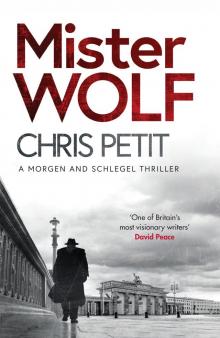 Mister Wolf
Mister Wolf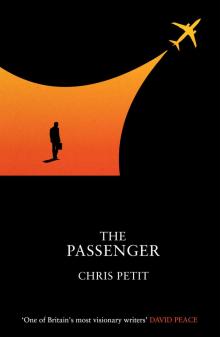 The Passenger
The Passenger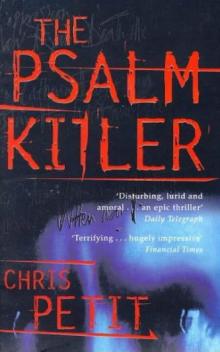 The Psalm Killer
The Psalm Killer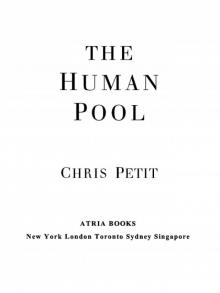 The Human Pool
The Human Pool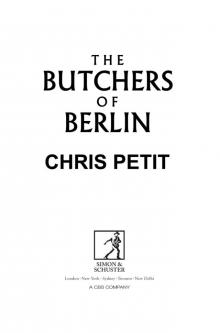 The Butchers of Berlin
The Butchers of Berlin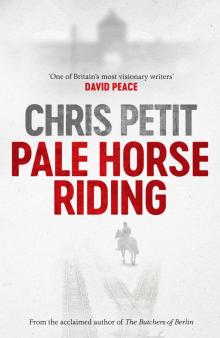 Pale Horse Riding
Pale Horse Riding